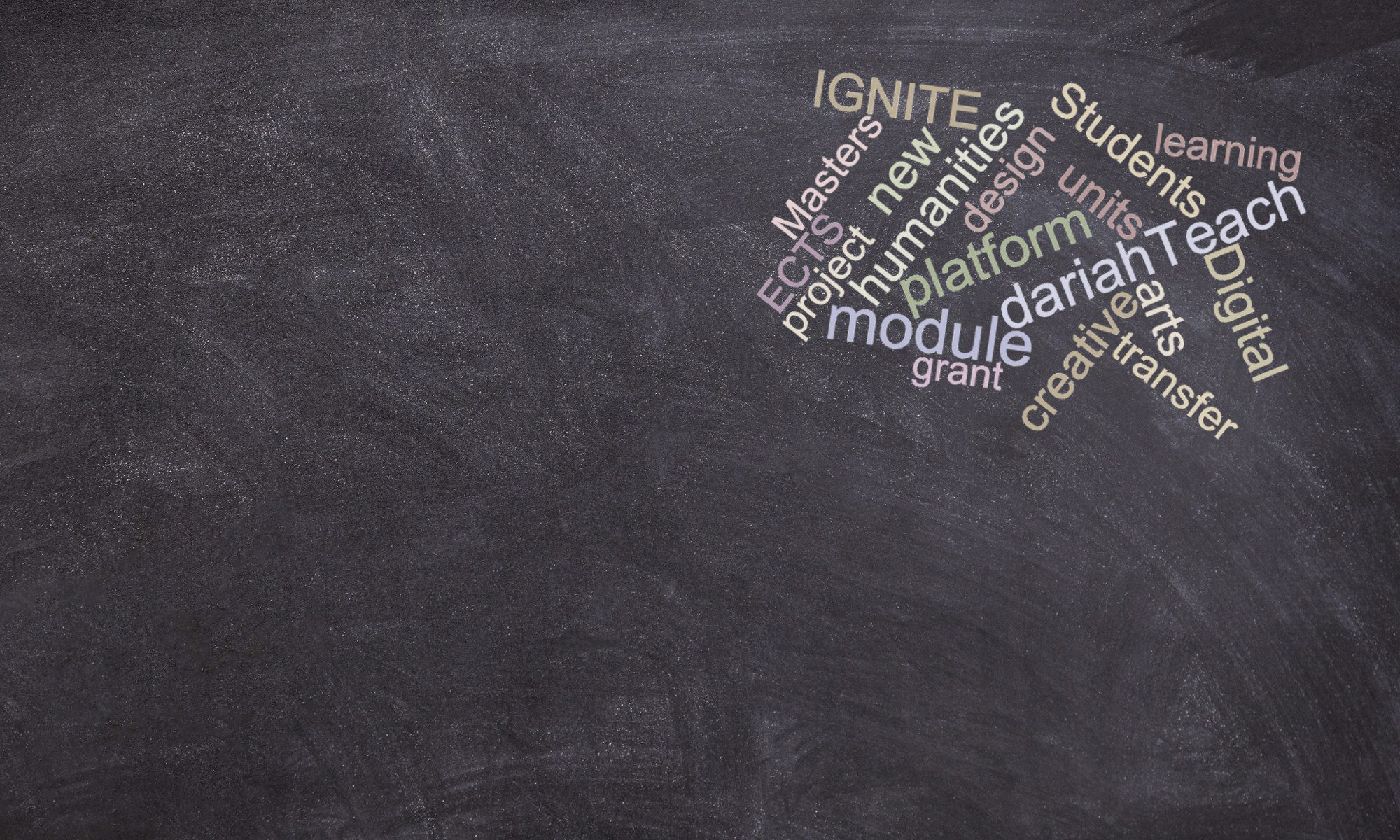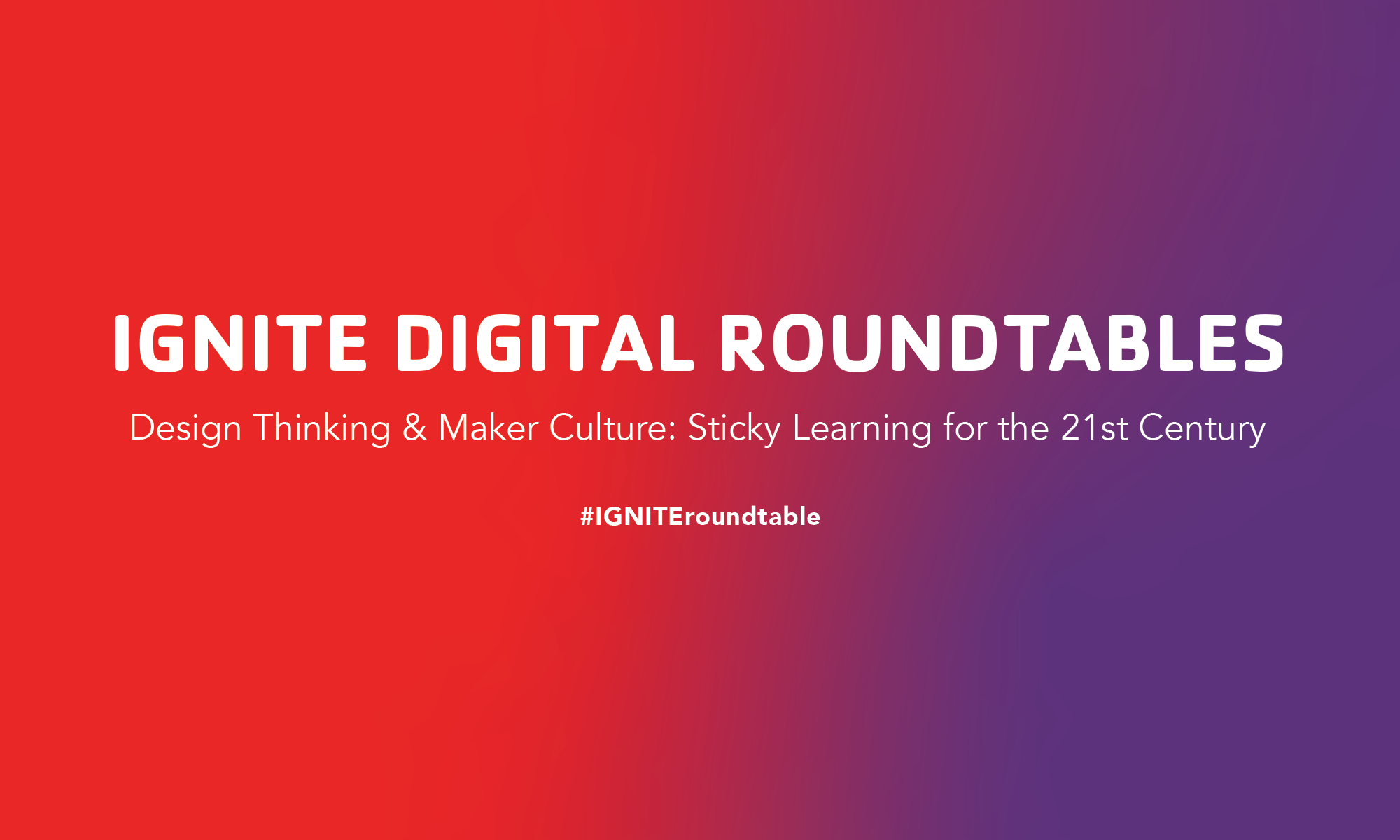Following the major success of the past series of IGNITE Digital Roundtables, we will hold the 5th session on ‘Design Thinking & Maker Culture: Sticky Learning for the 21st Century’. The digital roundtable session, which will be held on Thursday the 11th of June 2020 at 15:00 (CEST) via Zoom, aims to explore how we can leverage digital technologies and new methods of teaching to promote ‘sticky learning’ — learning that is retained well after it is taught.
In the 5th session, the speakers will cover subjects, such as the ethos of both Design Thinking and Maker Culture, digital storytelling, digitising material culture and Phygital Heritage for teaching and learning in the humanities, featuring the #IGNITE courses. The talks will also explore how humanities knowledge takes on and create solutions for global challenges while facilitating the digital transition of society.
The digital roundtable seeks to explore these themes within the wider areas of education within the digital humanities, cultural studies, and the creative and cultural industries, both as part traditional educational curricula as well as lifelong learning.
Session Schedule

Session Moderator:
Marianne Ping Huang (Aarhus University)
Speakers:
Marianne Ping Huang—Aarhus University (Denmark)
Introduction to Design Thinking & Making
Costas Papadopoulos—Maastricht University (the Netherlands)
Remaking Material Culture in 3D
Susan Schreibman—Maastricht University (the Netherlands)
Storytelling for Digital Narratives & Blended Spaces
Eslam Nofal—Maastricht University (the Netherlands)
Phygital Heritage: Design, Interaction, and Evaluation
Past IGNITE Digital Roundtable Sessions
We are delighted to announce the IGNITE digital roundtables on ‘Design Thinking & Maker Culture: Sticky Learning for the 21st Century’. The digital roundtables, which will be held on Wednesday afternoons through April via Zoom, aim to explore how we can leverage digital technologies and new methods of teaching to promote ‘sticky learning’ — learning that is retained well after it is taught.
Our speakers will cover subjects, such as digital innovation in teaching and learning in the humanities, flipped classroom teaching, maker culture as new forms of meaning-making and knowledge creation, how to prepare humanities students for a new labour market, and how can humanities knowledge take on and create solutions for global challenges while facilitating the digital transition of society.
The digital roundtables seek to explore these themes within the wider areas of education within the digital humanities, cultural studies, and the creative and cultural industries, both as part traditional educational curricula as well as lifelong learning.
Abstracts of the roundtable sessions
All the abstracts of the previous roundtable sessions are available here: https://ignite.acdh.oeaw.ac.at/abstracts-collection/

Session Video:
Ignite Round Table – Session 1
Session Moderator:
Marianne Ping Huang (Aarhus University)
Guest Speakers:
Reya Saliba—Learning & Student Outreach Librarian at Weill Cornell Medicine (Qatar)
Using the Flipped Classroom Model to Promote Critical Thinking and Lifelong Learning Skills
Barbara Heinisch—Researcher and Lecturer at University of Vienna (Austria)
Co-creation in Citizen Science as a Form of Lifelong Learning for Cultural Heritage
Martin Gerner—Freelance Sustainability Manager, Simulation-game Designer, Lecturer at Frankfurt University of Applied Sciences & Technische Universität Dresden (Germany)
Third Mission Calling – Accessing Creative Learning Environments through Blended Service Learning

Session video:
Ignite Round Table – Session 2
Session Moderator:
Marianne Ping Huang (Aarhus University)
Guest Speakers:
Jasmina Maric — University of Borås (Sweden)
A Brief Analysis of Teaching for 21st century Skills at Web Content Manager and Designer Program at the University of Borås
Susan Schreibman —Maastricht University (Netherlands), Marianne Ping Huang —Aarhus University (Denmark)
Design Thinking & Maker Culture in the IGNITE Curriculum: From Theory to Practice
Guido Stompff — Inholland University of Applied Sciences (Netherlands)
How to Practice Design Thinking & Making
Rikke Toft Nørgård — Aarhus University (Denmark)
What can we learn from using game Jams in higher education? Perspectives from teachers, students and professionals

Session video:
Ignite Round Table – Session 3
Session Moderator:
Costas Papadopoulos (Maastricht University)
Guest Speakers:
Eveline Wandl-Vogt—Austrian Academy of Sciences (Austria)
Makers Make: Creating Humanity Centered Open Organizations for the Purpose of Good
Ludovit Labik—Tomas Beta University (Czech Republic)
Filmmakers Collaboration on the World’s Digital Revolution
Florian Bettel—University of Applied Arts Vienna (Austria)
Digital Knowledge about Research and Teaching – A User-Centred Design Approach
Natasha Gomes—Goa University (India), Akshata Bhatt & Palia Pandit—Dhempe College of Arts and Science (India)
Design-Thinking Formal Correspondence: Gamification as Learning Intervention in Curriculum Delivery

Session video:
Ignite Round Table – Session 4
Session Moderator:
Part I: Marianne Ping Huang (Aarhus University)
PartII: Costas Papadopoulos (Maastricht University)
Guest Speakers:
Peter Knobloch—University of Applied Arts Vienna (Austria)
Maker culture and industrial development and production processes — possibilities and limitations to improve the sustainability of products
Vladimir Aleksic—University of Niš (Serbia)
Story Maps and Open Education in the Flipped Classroom
Esther Aminata Kamara—Maastricht University (the Netherlands)
Digital Oral Histories: a Critical Look at the Practice of Preserving Oral Histories and How This May Reflect on Digital Humanities/learning
Stefania Savva—Cyprus University of Technology (Cyprus)
Design Thinking in Interactive Digital Narratives for Culturally and Linguistically Diverse Students: Museum-school Synergies in Museum Affinity spaces
Chiara Zuanni & Franz Dörfler—University of Graz (Austria)
DigiCulture: a MOOC for Creative Industries Professionals
Nimrah Syed—Ontario College of Art & Design University (Canada)
Embracing Design Thinking for Sustainable Fashion


